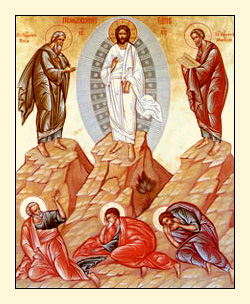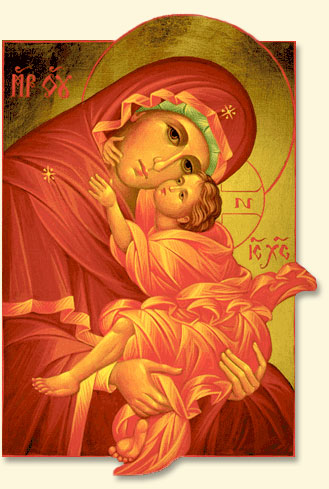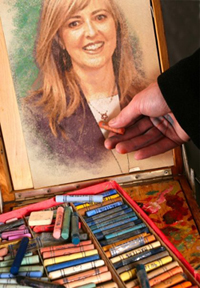The eye of my soul
 Friday, August 26, 2011 at 10:26AM
Friday, August 26, 2011 at 10:26AM Most of you know that our family converted from Protestantism to the Orthodox Church in 2007. I've shared fairly frequently on my blog about our journey--an incredible paradigm shift from Western to Eastern Christianity.
Today I would like to share an essay written by my daughter telling of our journey from her perspective. An English major, she wrote the essay as a project for one of her classes. After reading the essay, her instructor commented, "You have created a very compelling reflection on Christian Orthodoxy. I learned quite a bit from this, thank you." (Thankfully, she received an "A" on the paper as well!)
Here is her essay titled, "The Eye of My Soul":
Window into Heaven
The instant I swing the door open, the tranquil atmosphere engulfs me and my heart is calm. All anxieties and ambitions fade into nothing, as if someone has turned down their volume. I take a breath and step inside. I stand in the presence of God. A thousand windows into heaven surround me, each filled with the life of a Saint or joyous feast day. It is almost as if all their eyes focus on me as I enter the nave.
 The nearest is an icon depicting the Transfiguration of Christ. I make three small metanias while making the sign of the cross—thumb, middle, and forefingers together—the Trinity—pinky and ring clasped on my palm—the two natures of Christ—and venerate the picture before me, honoring its message.
The nearest is an icon depicting the Transfiguration of Christ. I make three small metanias while making the sign of the cross—thumb, middle, and forefingers together—the Trinity—pinky and ring clasped on my palm—the two natures of Christ—and venerate the picture before me, honoring its message.
The lingering fragrance of incense wafts toward me. A steady inhale converges all the memories associated with it to this one moment. I move to stand before the icon of Christ, and now, I lay aside all earthly cares, for I have entered the Orthodox Church.
Thirsty in a Dry Land
My initial feelings toward Orthodoxy were not so affectionate as I have just described. When one is torn from all that is familiar, immersed in an entirely different culture, and told to stay in this uncomfortable setting until the means to become uprooted are possible, it is quite easy to feel angry, overwhelmed, and rebellious.
I grew up Protestant, swaying each Sunday to the rock and roll, “Jesus-my-boyfriend” music. All I ever knew was how to have “fun” while worshiping. Entertainment stole the show, not God. And then my parents grew tired of it. I'll admit, so was I. I had no strong attachments to friends there; no real connections except familiarity.
So when I was fourteen, we left, and we searched. We searched for a year, each week trying out new churches. But it was slowly becoming apparent that nothing was different. While the style of music, the people, and even some of the doctrine may have varied, each church was essentially trying to promote the same program as the one we left . . . but they weren't as good.
Then we found it. My dad found it. Just when we were about to call quits on the extended shopping spree, we visited the Orthodox Church.
The Choice
My body feels nothing, though I have been sitting cramped against the wall for many minutes. Tears threaten to pour out at any moment. I won't let them. I lift up my head and shift my eyes toward my dad. I see and hear what I never have before nor since. He cries freely, and when he speaks, his voice trembles.
The picture of emotion caresses my heart, beginning to soften it. Yet I am determined to be angry. I resolve to keep my heart locked away, lest my pride be bruised, my intellect insulted, and my whole world inverted.
But my foundation is weak. I stand alone.
Finally, the tears break the dam, and my face becomes a silent river of defeat. I hate the thought of giving in, but I cannot keep resisting. I know my dad's plea is for the unity of our family. The bitterness in my belly squirms against its enemy of peace. I let out a shaky sigh.
“Once you get your license, you can go anywhere you want.”
. . . Seven months. That means seven months of torture. Of leaving my few friends, my familiarity, my comfort zone. But in seven months, I can return to them.
“Fine,” I softly mutter.
From now on, we attend Saint Andrew Orthodox Church.
Lessons
The first catechumen class I attended was not so embittering as I had imagined, although I cannot say I liked it. Being the the new person, and thus the center of attention (or so thought my fifteen-year-old self) did not appeal to me. Neither did the strange doctrine. In my defense, however, I was only a product of my environment, having grown up in western society among WASPs (White Anglo-Saxon Protestants). I had never known that anything different existed.
I never knew people had set rules of prayer for the morning, evening, and every other activity; I never knew material objects such as relics and icons were kissed to honor the persons involved; I never knew incense was used in church in order to stimulate all the senses and focus them toward the Divine; I never knew anyone believed that there is no dichotomy between the physical and spiritual; that what I do with my body, so does my soul. It was shocking to move from purely intellectual belief to experiential.
Eastern Christian culture rattled my western beliefs violently. Take a child used to eating soft foods and sweets, and immediately start feeding him meat at every meal. The Orthodox Church was arduous. It felt like entering the Marines with no prior physical exercise.
In addition to Sunday morning Liturgies (which lasted significantly longer than Protestant services), there were Wednesday and Saturday night Vespers, as well as catechumen classes once a week. In my Protestant days, I was used to attending a Sunday service probably three out of four times a month, and oftentimes begrudgingly.
Although I was determined to hate St. Andrew's strange, foreign nature, with its numerous services, it was only after I learned Orthodoxy's origins and history that I realized the weak structure of my own foundations. I could not argue with history and facts. I could not argue using my limited experience and knowledge. While I still wanted to ignore it, Orthodoxy forced me to know why I believed what I believed.
I must have attended three or four months worth of services, three times a week, before I could see that the lock to my heart was being slowly chipped away. But even if I had, secretly, decided to accept most of its doctrines, I still would not allow myself to believe one of the major tenets. I would not honor the greatest saint in the Orthodox Church, for I did not understand the implications (or lack of). My apprehension of Mary hindered my total allegiance.
The idea of giving such a high honor to any person other than God made me wary. In Protestantism, the focus is on Jesus alone, but in Orthodoxy, there is great emphasis on the Trinity, as well as the Saints—especially Mary. Such veneration of a human frightened me. When I looked upon the icon of the Mother of God, I felt uneasy. I would never become Orthodox when such thoughts and feelings plagued me.
My First Pascha
It is almost midnight, and the culmination of the year. After weeks of Great Lent, with hour-long services, standing until our legs are about to buckle, and meditating on the solemn passion of Christ, it is the Feast of the Resurrection: Pascha.
All is dark, all is quiet, except for the priest who stands at the altar. He holds one candle, the only source of light in the building. Cupping it carefully in his hand, he begins to chant,
Come receive the light
Not overcome by night
Come glorify Christ who is risen from the dead!
As he chants this hymn, he lights the deacons' and acolytes' candles. One by one, they light more. Soon, the entire church is ablaze with candlelight, and the choir joins the priest in song. Once everyone's candle is lit, the priest leads the way out of the church, and we process around the building, all the while singing this hymn. After the third time round the building, and the announcement of triumph offered by the priest, we begin to sing with all the strength and glory our voices will offer,
Christ is risen from the dead
trampling down death by death
and upon those in the tombs bestowing life!
Still singing this praise, we again process into the church, only now it is full of light! Every candle, every lamp, every chandelier is shining with brilliance, joining us in song. My soul feels joyous, and at peace. For the first time since attending Saint Andrew's, I do not shield myself from my surroundings. I absorb every note, every smile, and reflect the same. I feel the joy of the mystery of the Resurrection entering my heart.
She has accepted to bear the Son of God, and after her mother's grief at his crucifixion, He is risen. Why should I not reverence such humility, and partake of the same joy? Finally at peace, I participate with the rest of the congregation in the Liturgy of Pascha, praising God until the early hours of the morning.  Suddenly, I look up and see the icon of Mary, the Theotokos, or God-bearer. Her gaze captivates me, and I cannot tear my eyes away. While previously that face would have sent me away in anger and frustration, causing me to scramble for a defense, I now see and feel the tranquility that emanates from her countenance.
Suddenly, I look up and see the icon of Mary, the Theotokos, or God-bearer. Her gaze captivates me, and I cannot tear my eyes away. While previously that face would have sent me away in anger and frustration, causing me to scramble for a defense, I now see and feel the tranquility that emanates from her countenance.
That first Paschal service was life-changing for me. I walked into the church still fighting for my familiarity, and left realizing that truth is often the most uncomfortable message to be heard. After finally accepting the shift from a western American world view to an eastern Christian one, I was baptized at St. Andrew's a year after our initial visit.
I continue my journey as an Orthodox Christian, and while I have certainly passed the phase of being frightened because of a strange culture, I often forget that others are not always on the same page as I.
My conversion gives me a variety of looks from others. Some are intrigued and freely ask questions. Others are wary, cautiously inquiring about my faith. Many of my Protestant friends avoid any mention of my experience.
As difficult as it is to avoid my favorite subject with my favorite people, I must remind myself that they are in similar circumstances as I was before my extended Christian history lesson; in fact, they are most likely in a more accepting state than was I.
Shifting my identity to that of an international culture, while remaining in western society, is not easy. As important and wonderful as my journey to Orthodoxy has been, it is also a somewhat lonely path. While Orthodox Christianity makes up about a quarter of the Christians in the world, most of this is outside America.
It is difficult sometimes to experience such joy while seeing the strange looks others give when they observe me from the outside. But I am now more at home than I ever could have been elsewhere.




Reader Comments (1)
It's times like these that I wish I could express my words, whether it be via my lips or in the written form. I want to say things like, "beautiful, awesome expression of true faith, deeply moving, etc."
But, none of these words or any other I can think of can begin to describe how moving this blog is. Not only does it make me wish I could write like this, to be able to express my feelings like this, but I also wish I felt this deeply about my whole Christian experience.
So, I'll just say, "Totally awesome!"